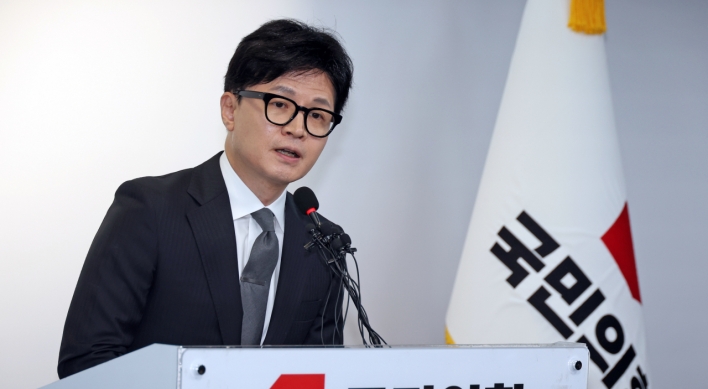[Editorial] Change the course
Price increase hits 10-year high; Big extra budget to worsen inflation
By Korea HeraldPublished : April 8, 2022 - 05:30
Consumer price increase has exceeded 4 percent. According to Statistics Korea, consumer prices rose 4.1 percent in March from the same month last year. It was the sharpest hike in 10 years and three months.
Prices soared, largely affected by the war in Ukraine which further disrupted the supply of crude oil and raw materials following the COVID-19 shockwaves to global supply chains.
Setbacks in the supply of oil and materials are hard to avoid for Korea, which imports most of its supply of both. Among others, a 31.2 percent rise in the price of petroleum products had the biggest impact on consumer price inflation in March.
The problem is that skyrocketing prices are not likely to subside soon. It is uncertain when the war will end and when the global supply network, broken in the wake of the pandemic and the war, will return to normal. So long as oil-producing countries do not increase output, inflation is bound to worsen.
The government on Tuesday unveiled measures to lower fuel taxes by 30 percent and subsidize fuel prices for commercial trucks for three months. The steps fall far short of keeping prices in check. Extraordinary measures are needed.
The recent skyrocketing prices were considerably affected by a global liquidity glut.
Many countries including Korea supplied an enormous amount of liquidity to prevent the pandemic from causing an economic recession. Increased liquidity stimulated inflation expectations. This is why central banks are signaling interest rate raises.
The Moon Jae-in administration expanded its spending without hesitation, increasing liquidity in the market from before the pandemic began.
It drew up supersized budgets each year for five years. COVID-19 was not the only reason. It now has to cope with the side effects of its failed policies such as sharply raising the minimum wage, creating taxpayer-subsidized temporary jobs and drastically increasing the number of public servant posts.
Major advanced economies reduced their government budgets this year to maintain fiscal soundness. But the Moon administration kept expanding expenditure, increasing its budget to 607 trillion won ($498 billion) from 558 trillion won last year.
The national debt has snowballed by more than 400 trillion won for the past five years. It is expected to reach 1,076 trillion won this year.
As a result of loose fiscal management, the country’s state liabilities, a broad-sense national debt which includes liabilities to replenish military and government employee pension funds, exceeded 2,000 trillion won for the first time last year. The figure jumped 53 percent, or 763 trillion won, from 1,433 trillion in 2016 to 2,196 trillion won last year.
State liabilities to fill in pension funds are estimated at 1,140 trillion won, about half of the total liabilities. This is a burden on future generations.
The Moon administration is leaving a debt-ridden economy to the next government.
The Yoon Suk-yeol administration faces the difficult tasks of stabilizing skyrocketing prices and putting a brake on exploding national debt. Retrenchment is inevitable.
Yoon made an election pledge to draw up a supplementary 50 trillion won budget to offer pandemic relief to small-business owners. The presidential transition committee says the budget can be funded by restructuring existing expenditure items, but raising all of the needed funds in that way is virtually impossible. The issue of government bonds looks inevitable.
Releasing tens of trillions of won when inflation fears and an enormous national debt overshadow the economy is like adding oil to the fire.
The new administration must review costly election pledges and filter out populist ones made mainly to curry favor with voters.
It is time to get out of the path the Moon administration has taken for five years.
Prices soared, largely affected by the war in Ukraine which further disrupted the supply of crude oil and raw materials following the COVID-19 shockwaves to global supply chains.
Setbacks in the supply of oil and materials are hard to avoid for Korea, which imports most of its supply of both. Among others, a 31.2 percent rise in the price of petroleum products had the biggest impact on consumer price inflation in March.
The problem is that skyrocketing prices are not likely to subside soon. It is uncertain when the war will end and when the global supply network, broken in the wake of the pandemic and the war, will return to normal. So long as oil-producing countries do not increase output, inflation is bound to worsen.
The government on Tuesday unveiled measures to lower fuel taxes by 30 percent and subsidize fuel prices for commercial trucks for three months. The steps fall far short of keeping prices in check. Extraordinary measures are needed.
The recent skyrocketing prices were considerably affected by a global liquidity glut.
Many countries including Korea supplied an enormous amount of liquidity to prevent the pandemic from causing an economic recession. Increased liquidity stimulated inflation expectations. This is why central banks are signaling interest rate raises.
The Moon Jae-in administration expanded its spending without hesitation, increasing liquidity in the market from before the pandemic began.
It drew up supersized budgets each year for five years. COVID-19 was not the only reason. It now has to cope with the side effects of its failed policies such as sharply raising the minimum wage, creating taxpayer-subsidized temporary jobs and drastically increasing the number of public servant posts.
Major advanced economies reduced their government budgets this year to maintain fiscal soundness. But the Moon administration kept expanding expenditure, increasing its budget to 607 trillion won ($498 billion) from 558 trillion won last year.
The national debt has snowballed by more than 400 trillion won for the past five years. It is expected to reach 1,076 trillion won this year.
As a result of loose fiscal management, the country’s state liabilities, a broad-sense national debt which includes liabilities to replenish military and government employee pension funds, exceeded 2,000 trillion won for the first time last year. The figure jumped 53 percent, or 763 trillion won, from 1,433 trillion in 2016 to 2,196 trillion won last year.
State liabilities to fill in pension funds are estimated at 1,140 trillion won, about half of the total liabilities. This is a burden on future generations.
The Moon administration is leaving a debt-ridden economy to the next government.
The Yoon Suk-yeol administration faces the difficult tasks of stabilizing skyrocketing prices and putting a brake on exploding national debt. Retrenchment is inevitable.
Yoon made an election pledge to draw up a supplementary 50 trillion won budget to offer pandemic relief to small-business owners. The presidential transition committee says the budget can be funded by restructuring existing expenditure items, but raising all of the needed funds in that way is virtually impossible. The issue of government bonds looks inevitable.
Releasing tens of trillions of won when inflation fears and an enormous national debt overshadow the economy is like adding oil to the fire.
The new administration must review costly election pledges and filter out populist ones made mainly to curry favor with voters.
It is time to get out of the path the Moon administration has taken for five years.
-
Articles by Korea Herald


![[Exclusive] Korean military set to ban iPhones over 'security' concerns](http://res.heraldm.com/phpwas/restmb_idxmake.php?idx=644&simg=/content/image/2024/04/23/20240423050599_0.jpg&u=20240423183955)

![[Graphic News] 77% of young Koreans still financially dependent](http://res.heraldm.com/phpwas/restmb_idxmake.php?idx=644&simg=/content/image/2024/04/22/20240422050762_0.gif&u=)



![[Pressure points] Leggings in public: Fashion statement or social faux pas?](http://res.heraldm.com/phpwas/restmb_idxmake.php?idx=644&simg=/content/image/2024/04/23/20240423050669_0.jpg&u=)










